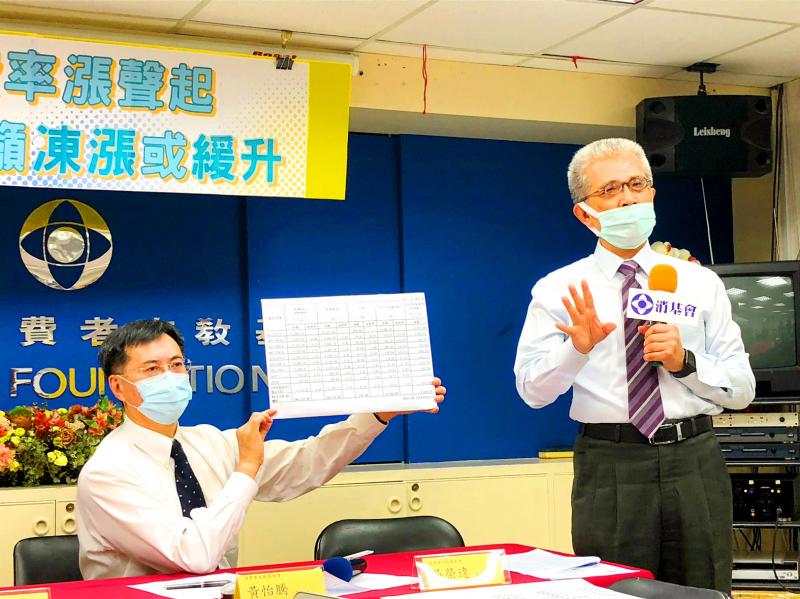The Consumers’ Foundation yesterday called on the government to suspend or lower its planned increase of National Health Insurance (NHI) premiums in light of economic woes felt in the wake of the COVID-19 pandemic.
The National Health Insurance Administration (NHIA) is considering raising premiums from 4.69 percent to 5.52 or 5.55 percent.
Income for businesses and ordinary people worldwide have taken a beating from the pandemic, the foundation said, urging the government to “feel the suffering of the people” and either freeze or lower the premium hike.

Photo: Lo Chi, Taipei Times
Article 3 of the National Health Insurance Act (全民健保法) stipulates that the government “should at least shoulder 36 percent of the remainder of the annual insurance budget minus promulgated revenues,” foundation deputy director-general Wu Jung-ta (吳榮達) said.
With the NHI’s finances in a sorry state and the end of the pandemic uncertain, the government should show compassion for the challenges people are enduring and bear a larger proportion of health insurance premiums, Wu said.
The government should budget for health expenditures and avoid adding to the burden placed on the NHI by leaving payments up to the agency, he added.
As for expanding revenue channels for the NHI, Wu pointed to Article 76 of the act, which allows for a “social health and welfare surcharge” to be placed on sales of alcohol and tobacco to generate revenue for the NHI reserve fund.
A tobacco surcharge has been implemented for many years, but an equivalent tax on alcohol has not yet been levied, he said.
Wu also recommended that the government consider emulating other nations by imposing a sugar tax, which could raise awareness of the dangers associated with consuming excessive amounts of sugar and provide a significant revenue source for the NHI.
According to the NHI’s estimated budget for next year, if premiums remain unchanged and additional funds are not raised elsewhere, the NHI reserve fund would fall below safe levels by the end of the year.
Officials therefore plan to discuss raising premiums during the NHI Committee meeting on Friday next week.
At this point, as raising premiums for next year appears inevitable, the government should at least consider limiting the premium to 4.91 or 5.17 percent at most, the amount it used to be, Wu added.

Alain Robert, known as the "French Spider-Man," praised Alex Honnold as exceptionally well-prepared after the US climber completed a free solo ascent of Taipei 101 yesterday. Robert said Honnold's ascent of the 508m-tall skyscraper in just more than one-and-a-half hours without using safety ropes or equipment was a remarkable achievement. "This is my life," he said in an interview conducted in French, adding that he liked the feeling of being "on the edge of danger." The 63-year-old Frenchman climbed Taipei 101 using ropes in December 2004, taking about four hours to reach the top. On a one-to-10 scale of difficulty, Robert said Taipei 101

Nipah virus infection is to be officially listed as a category 5 notifiable infectious disease in Taiwan in March, while clinical treatment guidelines are being formulated, the Centers for Disease Control (CDC) said yesterday. With Nipah infections being reported in other countries and considering its relatively high fatality rate, the centers on Jan. 16 announced that it would be listed as a notifiable infectious disease to bolster the nation’s systematic early warning system and increase public awareness, the CDC said. Bangladesh reported four fatal cases last year in separate districts, with three linked to raw date palm sap consumption, CDC Epidemic Intelligence

US climber Alex Honnold left Taiwan this morning a day after completing a free-solo ascent of Taipei 101, a feat that drew cheers from onlookers and gained widespread international attention. Honnold yesterday scaled the 101-story skyscraper without a rope or safety harness. The climb — the highest urban free-solo ascent ever attempted — took just more than 90 minutes and was streamed live on Netflix. It was covered by major international news outlets including CNN, the New York Times, the Guardian and the Wall Street Journal. As Honnold prepared to leave Taiwan today, he attracted a crowd when he and his wife, Sanni,

Two Taiwanese prosecutors were questioned by Chinese security personnel at their hotel during a trip to China’s Henan Province this month, the Mainland Affairs Council (MAC) said yesterday. The officers had personal information on the prosecutors, including “when they were assigned to their posts, their work locations and job titles,” MAC Deputy Minister and spokesman Liang Wen-chieh (梁文傑) said. On top of asking about their agencies and positions, the officers also questioned the prosecutors about the Cross-Strait Joint Crime-Fighting and Judicial Mutual Assistance Agreement, a pact that serves as the framework for Taiwan-China cooperation on combating crime and providing judicial assistance, Liang